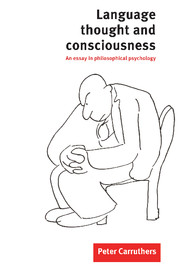Book contents
- Frontmatter
- Contents
- Preface
- Introduction
- 1 The geography of the issues
- 2 Which language do we think with?
- 3 Thought-based semantics
- 4 Holism and language
- 5 First steps towards a theory of consciousness
- 6 Second (-order) steps towards a theory of consciousness
- 7 A reflexive thinking theory of consciousness
- 8 The involvement of language in conscious thinking
- Conclusion
- References
- Index
6 - Second (-order) steps towards a theory of consciousness
Published online by Cambridge University Press: 01 June 2011
- Frontmatter
- Contents
- Preface
- Introduction
- 1 The geography of the issues
- 2 Which language do we think with?
- 3 Thought-based semantics
- 4 Holism and language
- 5 First steps towards a theory of consciousness
- 6 Second (-order) steps towards a theory of consciousness
- 7 A reflexive thinking theory of consciousness
- 8 The involvement of language in conscious thinking
- Conclusion
- References
- Index
Summary
In the present chapter I shall outline, and criticise in turn, a number of higher-order thought theories of consciousness, due to David Armstrong, David Rosenthal, Daniel Dennett, and others. Elements of these theories will then be incorporated into my own reflexive thinking theory, to be presented in the next chapter. Remember that one important strategic aim of this discussion is to see whether there is any plausible theory of consciousness which might undermine the introspective argument of Chapter 2. This point will be taken up in the final section of the chapter.
Theory 1: actual and conscious
Armstrong and others have argued that conscious states are those which cause, or are apt to cause, a belief in their own existence – claiming that conscious experiences are those which cause (or are apt to cause) a belief that there is such an experience taking place; that conscious beliefs are those which cause (or are apt to cause) a belief that one has that belief; and so on (see Armstrong, 1968 and 1984, Mellor, 1977 and 1980, and Rosenthal, 1986, 1991 and 1993). Such accounts are higher-order because the conscious status of any given conscious state is explained in terms of mental states (specifically beliefs or thoughts) which are about it, which contain a reference to it embedded in their content. I have just now argued, in section 5.8, that some version of higher-order thought theory must be correct; our immediate task is to consider a number of more precisely specified variants on the approach.
Information
- Type
- Chapter
- Information
- Language, Thought and ConsciousnessAn Essay in Philosophical Psychology, pp. 164 - 193Publisher: Cambridge University PressPrint publication year: 1996
